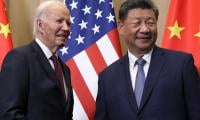ISLAMABAD: Pakistan Friday rejected the Treaty on Prohibition of Nuclear Weapons that came into force on January 21 and said it was not bound by any of its obligations.
“Pakistan stresses that this Treaty neither forms a part of, nor contributes to the development of customary international law in any manner,” said the Foreign Office though it was welcomed by UN Secretary General Antonio Guterres.
The Foreign Office stressed that it was indispensable for any initiative on nuclear disarmament to take into account the vital security considerations of each and every state.
Rejecting the treaty the Foreign Office said the treaty, which was adopted in July 2017, was negotiated outside the established UN disarmament negotiating forums.
“None of the nuclear armed states, including Pakistan, took part in the negotiations of the treaty which failed to take on board the legitimate interests of all the stakeholders. Many non-nuclear armed states have also refrained from becoming Parties to the Treaty,” pointed out the Foreign Office.
The United Nations General Assembly, at its first special session devoted to nuclear disarmament in 1978, had agreed by consensus that in the adoption of disarmament measures, the right of each State to security should be kept in mind, and at each stage of the disarmament process the objective would be undiminished security for all states at the lowest possible level of armaments and military forces.
“Pakistan believes that this cardinal objective can only be achieved as a cooperative and universally agreed undertaking, through a consensus-based process involving all the relevant stakeholders, which results in equal and undiminished security for all States”, added the Foreign Office.
Meanwhile, according to a statement from the office of the UN Secretary General Antonio Guterres, the UN welcomed the entry into force of the Treaty on the Prohibition of Nuclear Weapons, commonly known as the Nuclear Weapon Ban Treaty. “I am pleased to recognize today’s entry into force of the Treaty on the Prohibition of Nuclear Weapons, the first multilateral nuclear disarmament treaty in more than two decades. The treaty is an important step towards the goal of a world free of nuclear weapons and a strong demonstration of support for multilateral approaches to nuclear disarmament,” Guterres said in a video message. He commended the states that had ratified the treaty and welcomed the instrumental role of civil society in advancing negotiation and entry into force. The survivors of nuclear explosions and nuclear tests offered tragic testimonies and were a moral force behind the treaty. Entry into force is a tribute to their enduring advocacy, he said.
“I look forward to carrying out the functions assigned by the treaty, including in preparation for the first meeting of states parties,” he added. Elimination of nuclear weapons remains the highest disarmament priority of the United Nations, he said. “I call on all states to work together to realise this ambition to advance common security and collective safety.”
During hearing, 41 accused, including provincial Minister Meena Khan and MNA Asif Khan, appeared before court
Peshawar City Senior Vice President Malik Aslam and General Secretary Taqdeer Ali resigned from their posts
As token of appreciation, KP Culture and Tourism Authority presented them with traditional shawls
Building fires are common in India due to lack of firefighting equipment and routine disregard for safety regulations
He was speaking at United Nations Climate Change Conference in Baku, Azerbaijan
Protesters had occupied parliament in protest at an investment agreement with Moscow







